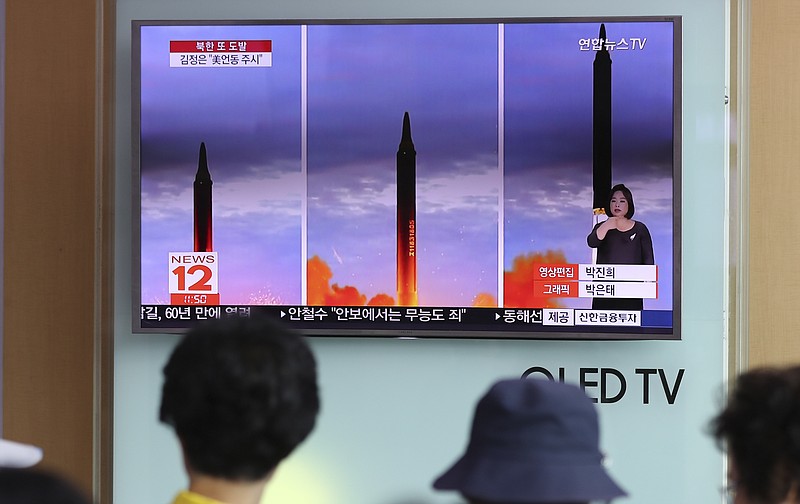SEOUL, South Korea (AP) - The United States on Thursday flew some of its most advanced warplanes to South Korea to take part in bombing drills aimed at intimidating North Korea, after Pyongyang fired a midrange ballistic missile over Japan earlier this week, South Korea's military said.
Two U.S. B-1B supersonic bombers and four F-35 stealth fighter jets joined four South Korean F-15 fighters in live-fire exercises at a military field in eastern South Korea that simulated precision strikes against the North's "core facilities," an official from Seoul's Defense Ministry said.
The B-1Bs were flown in from Andersen Air Force Base in Guam while the F-35s came from a U.S. base in Iwakuni, Japan, the official said. He didn't want to be named, citing office rules.
The United States often sends its warplanes to South Korea when animosity rises on the Korean Peninsula, which is technically in a state of war because the 1950-53 Korean War ended with an armistice, not a peace treaty.
North Korea on Tuesday flew a potentially-nuclear capable Hwasong-12 intermediate range missile over northern Japan and later called it a "meaningful prelude" to containing the U.S. territory of Guam. North Korean leader Kim Jong Un called for his military to conduct more ballistic missile launches targeting the Pacific Ocean to advance the capabilities of its strategic force.
North Korea has been maintaining a torrid pace in weapons tests this year as it openly pursues a nuclear-armed, intercontinental ballistic missile capable of reaching deep into the U.S. mainland. Experts say Kim is clearly seeking a real nuclear deterrent against the United States to ensure the survival of his government and likely believes that will strengthen his negotiating position when North Korea returns to talks.
Pyongyang had earlier threatened to fire a salvo of Hwasong-12s toward Guam, which is home to key U.S. military bases and strategic long-range bombers the North finds threatening, and flight tested a pair of developmental ICBMs in July.
South Korean analysts said that the North's threat against Guam and the launch over Japan on Tuesday are likely part of attempts to make launches over Japan an accepted norm and won itself greater military space in a region dominated by enemies.
Russia warns U.S. against new sanctions on North Korea
MOSCOW (AP) - Russian Foreign Minister Sergey Lavrov has warned U.S. Secretary of State Rex Tillerson that potential new sanctions against North Korea would be "dangerous."Lavrov and Tillerson spoke by phone late Wednesday, several hours after U.S. President Donald Trump said on Twitter that "talking is not the answer" when it comes to dealing with North Korea.Russia's Foreign Ministry said in a read-out of the call late Wednesday that both Lavrov and Tillerson condemned North Korea for firing a midrange ballistic missile Japan earlier this week and called for dialogue.Lavrov told Tillerson that Russia urges all parties to avoid a military solution to the crisis and added that Moscow views any new potential sanctions against North Korea as "counterproductive and dangerous."
